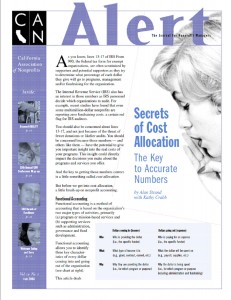 Here are some more nonprofit accounting and financial questions that have come to from this site and from my workshops and my answers.
Here are some more nonprofit accounting and financial questions that have come to from this site and from my workshops and my answers.
Question – Should the donor know?
I am curious to know if FASB 116 or FASB 117 prohibit the use of endowment as collateral against a line of credit without donor’s acknowledgment or knowledge of this action.
Answer – I do not believe that either of those prohibit the use of endowment funds as collateral. But unless the donor has told you it is OK to use the funds in that fashion I would be very wary of doing so without the donor’s consent. It has happened before that nonprofits have used the funds as collateral and then lost those funds. You could be in for some hard times if that happens.
Question – SAS 112 issues
For the past two years, our auditor firm has noted material weakness in the management letter due to the fact that there are adjustments made to deferred membership revenue, interest revenue, depreciation, etc. We were told that this could impact us getting grant monies and these “weaknesses” need to be corrected.
It was my understanding that an audit was to make necessary adjustments so that the books balance and reflect the current financial state. We were told by our auditing team this year that there are not allowed to make adjustments to our books and that is why there are material weaknesses. This has never been an issue before last year nor was it an issue with other auditing firms. Any guidance?
Answer – Those SAS rules for risk assessment kicked in at the end of 2006. As these weaknesses are listed in the Management Letter and become a part of the audit, a funder who asks for a copy of the audit might question what those weaknesses are. The SAS rules change what auditors are allowed to do. Making changes to your books may infringe on their independence, which under the new rules is a pretty big issue.
The purpose of an audit is to verify the quality and soundness of your organization’s financial reporting. The errors they find are now up to you to fix. If they can give you some direction on how to fix them and then how to do the entries correctly going forward you should not have anymore problems. Otherwise, if the auditors keep finding the same mistakes the language gets more severe.
Question – Remote Employees
Do you know of any best Practices with regards to remote employees or employees who work from home?
Answer – Here are two articles that may be of help:
- http://sloanreview.mit.edu/the-magazine/articles/2009/fall/51116/set-up-remote-workers-to-thrive/
- http://gmj.gallup.com/content/23209/getting-most-remote-workers.aspx
More questions answered in the next post!

 A few years back I co-wrote an article about getting accurate numbers from your financial system for the
A few years back I co-wrote an article about getting accurate numbers from your financial system for the 
